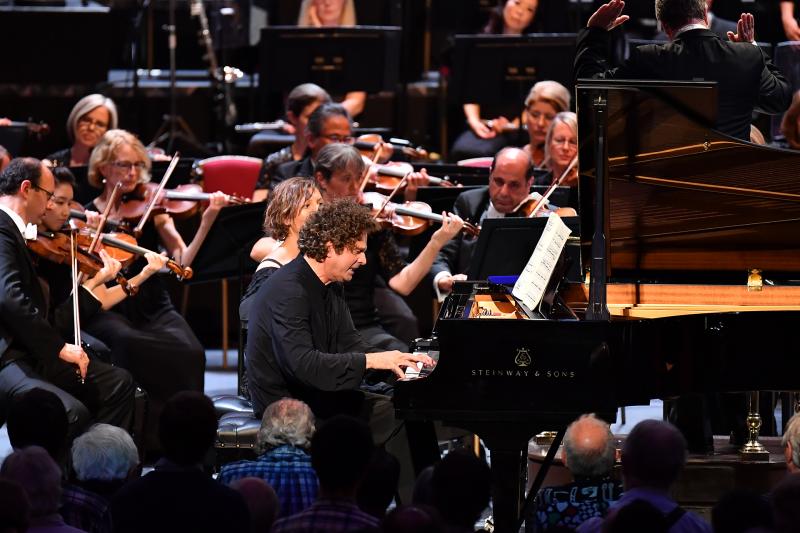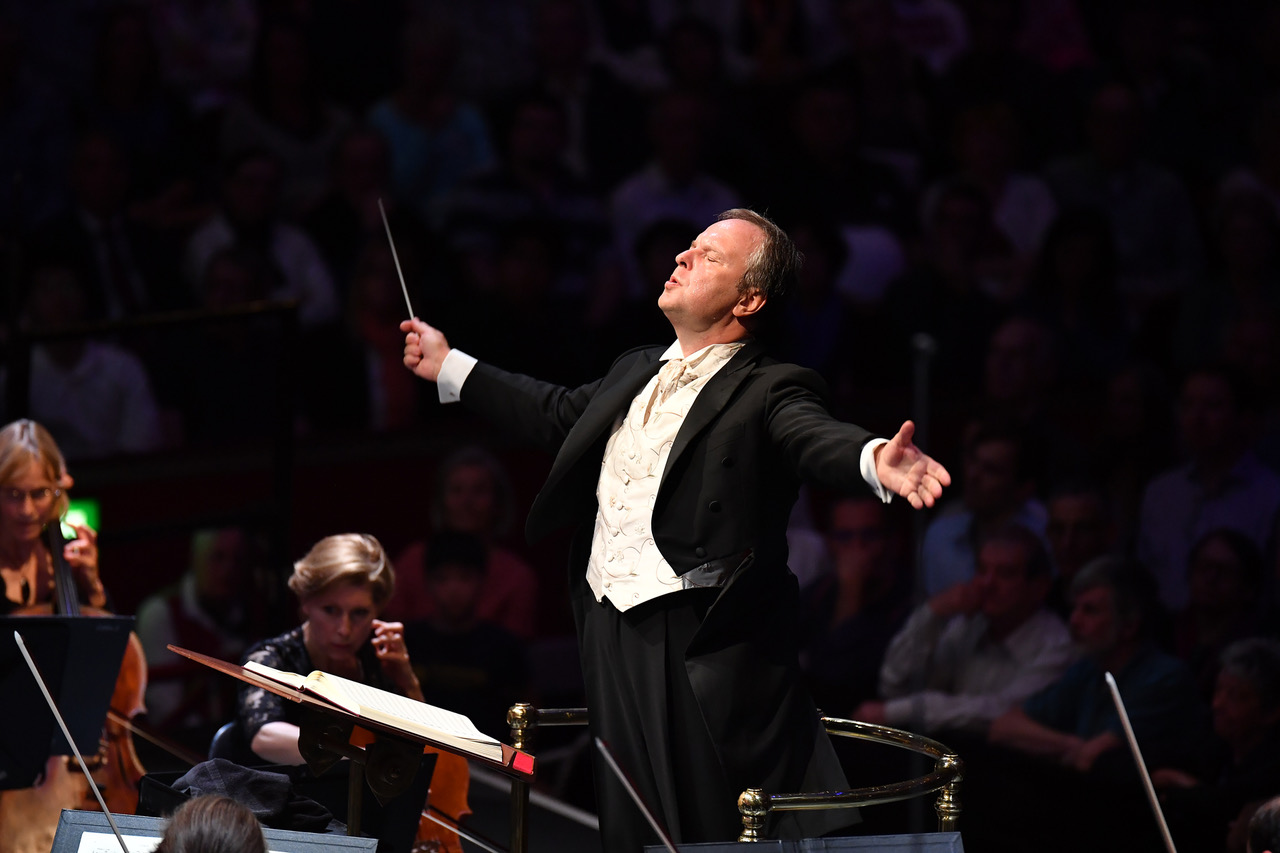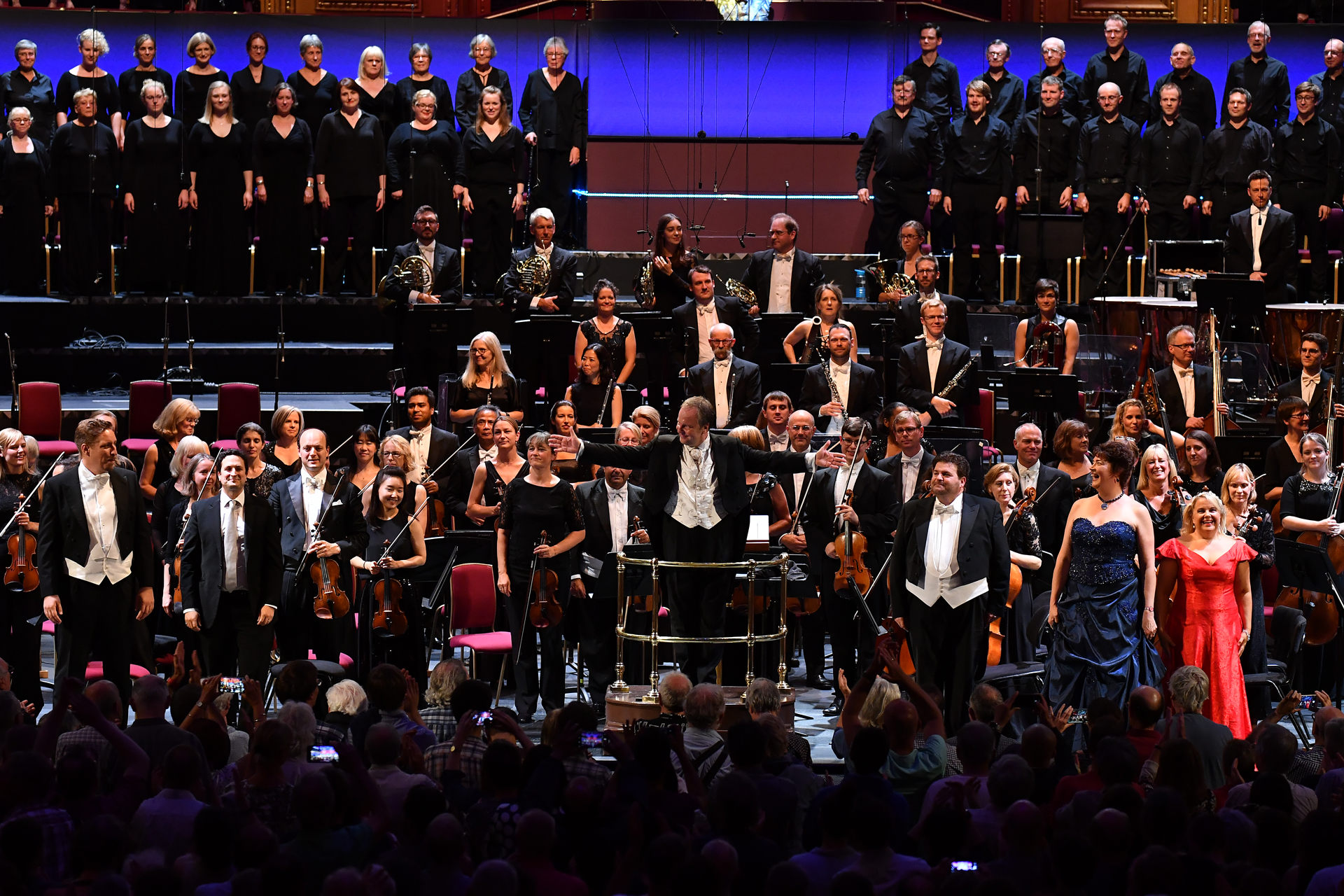Prom 43: Haefliger, BBCSO & Chorus, Oramo review – the frisson of the new | reviews, news & interviews
Prom 43: Haefliger, BBCSO & Chorus, Oramo review – the frisson of the new
Prom 43: Haefliger, BBCSO & Chorus, Oramo review – the frisson of the new
Two exciting premieres and a valuable old chestnut in an uplifting evening

Time was, not long ago, when the very word “premiere” was enough to ensure a sizeable smattering of red plush holes in the Royal Albert Hall audience. It seemed people did not want to risk attending new works for fear they would sound ghastly.
This programme included two world premieres. Jonathan Dove's We Are One Fire is a 90th anniversary celebration for the BBC Symphony Chorus, inspired by the message of humanity in Schiller’s Ode to Joy and drawing on the idea that, in the composer’s words, “20th-century archaeology showed us that we are all indeed brothers and sisters.”
Dove’s regular librettist, Alisdair Middleton, has provided spare, focused words with a music of their own (try saying “a million, million shimmering leaves” aloud and you’ll see what I mean) and Dove’s a cappella piece, in three short contrasting movements, is spare and focused as well, elegantly shaped and creating with choir alone some of the musical effects you might more often encounter with a full, glittering orchestra: for instance, “River running” becomes an ongoing perpetuum mobile with the word “Red” glinting above it in multiple sunbursts. It’s a beautifully written, warm and moving work, and the chorus with its conductor Neil Ferris seemed to perform it straight from the heart.
The Swiss composer Dieter Ammann has produced that exciting rarity, a terrific new piano concerto. Subtitled "Gran Toccata", it does what it says on the page: it’s a grand-scale display piece, a tremendous workout for soloist and orchestra alike, unfolding chiefly at high speed in one movement lasting about 25 minutes.  On first hearing it seems to be all about managing the flow of energy through the busy canvas, for the sound of which “a million, million shimmering leaves” would not be entirely inappropriate. The busy pianist is often absorbed into the panoply of orchestral textures; here and there, moments emerge when the soloist is alone and meditative. Frequently the piano sound is surrounded and blended with ample percussion, which creates the fascinating impression of magnifying the instrument and its colouristic potential.
On first hearing it seems to be all about managing the flow of energy through the busy canvas, for the sound of which “a million, million shimmering leaves” would not be entirely inappropriate. The busy pianist is often absorbed into the panoply of orchestral textures; here and there, moments emerge when the soloist is alone and meditative. Frequently the piano sound is surrounded and blended with ample percussion, which creates the fascinating impression of magnifying the instrument and its colouristic potential.
The language is original and wide-ranging, from snippets of Messiaen-like melodic motifs to the oozing microtones in the strings during the extended coda where everything slows down, turning unexpected corners into a new type of landscape. Springing from one spiky note on the piano, repeated with something resembling a bebung effect, the work ends more or less as it began, that motif transformed into a musical heartbeat. I wonder if the whole is perhaps a teeny bit over-extended – some of the ideas seemed to take up more time and space than they supported. Still, co-commissioned by a host of international festivals, each of which will present the piece in due course, this is a concerto that should reward repeated hearing – there is a lot going on, and I mean a lot.
Andreas Haefliger was the splendid soloist, cool, capable and unfazed through Ammann’s most dizzying pianistic challenges, and the conductor Sakari Oramo (pictured above) paced, balanced and defined the laden sonic canvas to fine effect. The piece might fare better in one of its other home halls, such as Boston or Lucerne, in which a clearer acoustic could make it easier for audience and orchestra alike to hear what is really going on amid all that sound.  Beethoven’s Ninth Symphony is, of course, a Proms favourite. Oramo’s take on it was straightforward, unusually light-footed and rather friendly. Though very well played by the BBC Symphony Orchestra, the interpretation could have used more grandeur and imagination in the first three movements; but the choral finale took off with Mika Kares’s eloquent bass solo; the BBC Symphony Chorus and the team of soloists – Anu Komsi (soprano), Hilary Summers (mezzo-soprano), Michael Weinius (tenor) and Kares – delivered Beethoven’s often ungrateful vocal writing with great gusto (curtain call pictured above). The message of universal siblinghood soared home, sending out Beethoven and Schiller’s “kiss to the whole world” to a country that currently needs it more than ever before.
Beethoven’s Ninth Symphony is, of course, a Proms favourite. Oramo’s take on it was straightforward, unusually light-footed and rather friendly. Though very well played by the BBC Symphony Orchestra, the interpretation could have used more grandeur and imagination in the first three movements; but the choral finale took off with Mika Kares’s eloquent bass solo; the BBC Symphony Chorus and the team of soloists – Anu Komsi (soprano), Hilary Summers (mezzo-soprano), Michael Weinius (tenor) and Kares – delivered Beethoven’s often ungrateful vocal writing with great gusto (curtain call pictured above). The message of universal siblinghood soared home, sending out Beethoven and Schiller’s “kiss to the whole world” to a country that currently needs it more than ever before.
rating
Explore topics
Share this article
The future of Arts Journalism
You can stop theartsdesk.com closing!
We urgently need financing to survive. Our fundraising drive has thus far raised £49,000 but we need to reach £100,000 or we will be forced to close. Please contribute here: https://gofund.me/c3f6033d
And if you can forward this information to anyone who might assist, we’d be grateful.

Subscribe to theartsdesk.com
Thank you for continuing to read our work on theartsdesk.com. For unlimited access to every article in its entirety, including our archive of more than 15,000 pieces, we're asking for £5 per month or £40 per year. We feel it's a very good deal, and hope you do too.
To take a subscription now simply click here.
And if you're looking for that extra gift for a friend or family member, why not treat them to a theartsdesk.com gift subscription?
more Classical music
 Kohout, Spence, Braun, Manchester Camerata, Huth, RNCM, Manchester review - joy, insight, imagination and unanimity
Celebration of the past with stars of the future at the Royal Northern College
Kohout, Spence, Braun, Manchester Camerata, Huth, RNCM, Manchester review - joy, insight, imagination and unanimity
Celebration of the past with stars of the future at the Royal Northern College
 Jansen, LSO, Pappano, Barbican review - profound and bracing emotional workouts
Great soloist, conductor and orchestra take Britten and Shostakovich to the edge
Jansen, LSO, Pappano, Barbican review - profound and bracing emotional workouts
Great soloist, conductor and orchestra take Britten and Shostakovich to the edge
 Jakub Hrůša and Friends in Concert, Royal Opera review - fleshcreep in two uneven halves
Bartók kept short, and a sprawling Dvořák choral ballad done as well as it could be
Jakub Hrůša and Friends in Concert, Royal Opera review - fleshcreep in two uneven halves
Bartók kept short, and a sprawling Dvořák choral ballad done as well as it could be
 Hadelich, BBC Philharmonic, Storgårds, Bridgewater Hall, Manchester review - youth, fate and pain
Prokofiev in the hands of a fine violinist has surely never sounded better
Hadelich, BBC Philharmonic, Storgårds, Bridgewater Hall, Manchester review - youth, fate and pain
Prokofiev in the hands of a fine violinist has surely never sounded better
 Monteverdi Choir, ORR, Heras-Casado, St Martin-in-the-Fields review - flames of joy and sorrow
First-rate soloists, choir and orchestra unite in a blazing Mozart Requiem
Monteverdi Choir, ORR, Heras-Casado, St Martin-in-the-Fields review - flames of joy and sorrow
First-rate soloists, choir and orchestra unite in a blazing Mozart Requiem
 Cho, LSO, Pappano, Barbican review - finely-focused stormy weather
Chameleonic Seong-Jin Cho is a match for the fine-tuning of the LSO’s Chief Conductor
Cho, LSO, Pappano, Barbican review - finely-focused stormy weather
Chameleonic Seong-Jin Cho is a match for the fine-tuning of the LSO’s Chief Conductor
 Classical CDs: Shrouds, silhouettes and superstition
Cello concertos, choral collections and a stunning tribute to a contemporary giant
Classical CDs: Shrouds, silhouettes and superstition
Cello concertos, choral collections and a stunning tribute to a contemporary giant
 Appl, Levickis, Wigmore Hall review - fun to the fore in cabaret and show songs
A relaxed evening of light-hearted fare, with the accordion offering unusual colours
Appl, Levickis, Wigmore Hall review - fun to the fore in cabaret and show songs
A relaxed evening of light-hearted fare, with the accordion offering unusual colours
 Lammermuir Festival 2025, Part 2 review - from the soaringly sublime to the zoologically ridiculous
Bigger than ever, and the quality remains astonishingly high
Lammermuir Festival 2025, Part 2 review - from the soaringly sublime to the zoologically ridiculous
Bigger than ever, and the quality remains astonishingly high
 BBC Proms: Ehnes, Sinfonia of London, Wilson review - aspects of love
Sensuous Ravel, and bittersweet Bernstein, on an amorous evening
BBC Proms: Ehnes, Sinfonia of London, Wilson review - aspects of love
Sensuous Ravel, and bittersweet Bernstein, on an amorous evening
 Presteigne Festival 2025 review - new music is centre stage in the Welsh Marches
Music by 30 living composers, with Eleanor Alberga topping the bill
Presteigne Festival 2025 review - new music is centre stage in the Welsh Marches
Music by 30 living composers, with Eleanor Alberga topping the bill
 Lammermuir Festival 2025 review - music with soul from the heart of East Lothian
Baroque splendour, and chamber-ensemble drama, amid history-haunted lands
Lammermuir Festival 2025 review - music with soul from the heart of East Lothian
Baroque splendour, and chamber-ensemble drama, amid history-haunted lands

Add comment